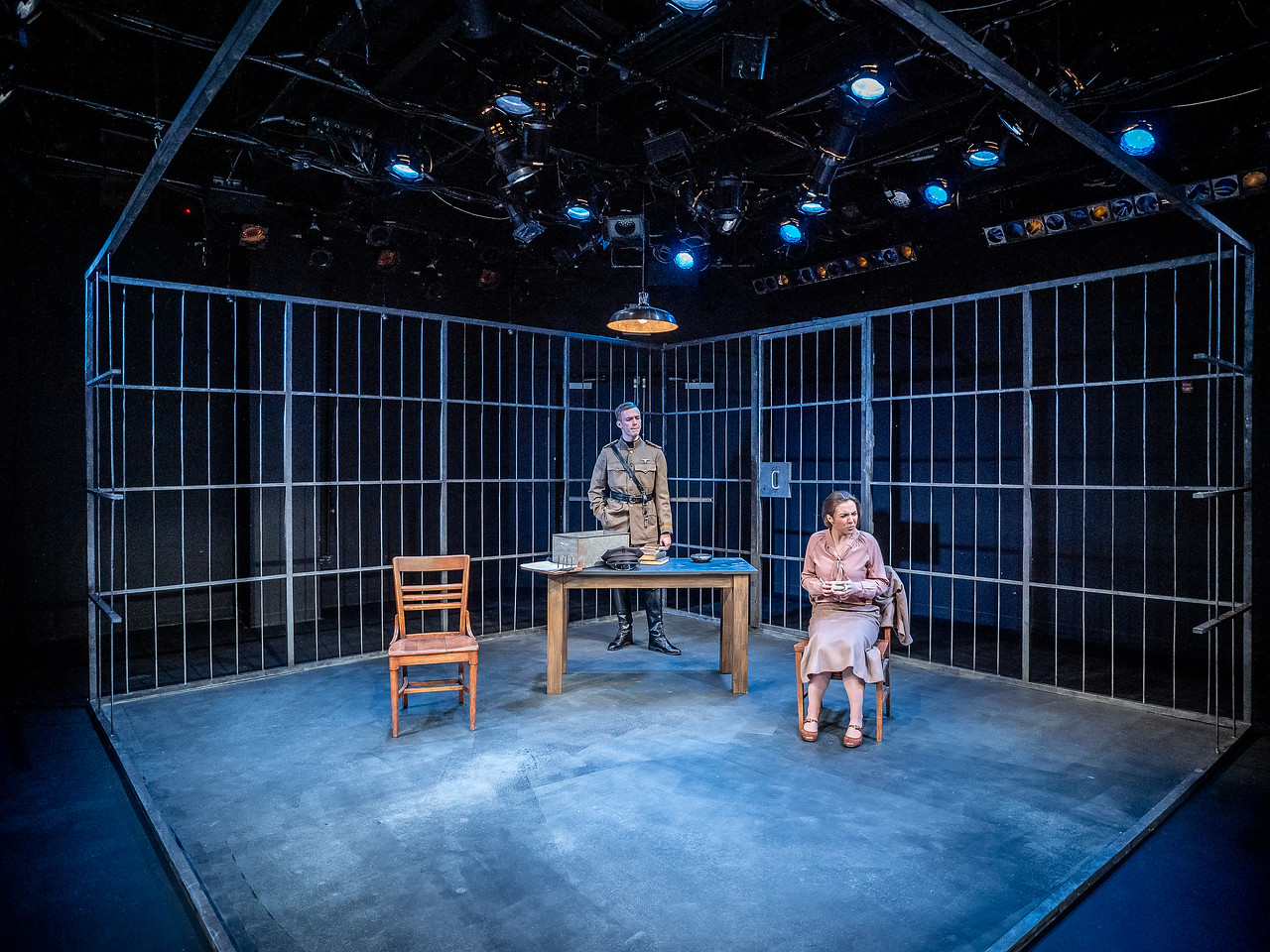 Karl Frick (Brett Temple) with Hannah Stern (Giuliana Carr) in Mrs. Stern Wanders the Prussian State Library at Luna Stage – Photo by Mike Peters Montclair State.
Karl Frick (Brett Temple) with Hannah Stern (Giuliana Carr) in Mrs. Stern Wanders the Prussian State Library at Luna Stage – Photo by Mike Peters Montclair State. It’s Berlin, 1933. Adolf Hitler has just declared martial law, and political activism has become a crime. Karl Frick, a young Gestapo officer, gets promoted from the criminal police to the newly created political division. In his first week, he arrests Johanna Stern (later known as Hannah Arendt), a graduate student seen copying documents in the library. Frick charges her with treason, punishable by death.
So begins the world premiere of “Mrs. Stern Wanders the Prussian State Library” at the Luna Stage in West Orange, N.J., which runs until Nov. 17. The play was written by Jenny Lyn Bader, who is on the board of advisers of Bard College’s Hannah Arendt Center, where her husband, Roger Berkowitz, is founder and director.
Bader was looking for a way to dramatize a part of Arendt’s life that would connect her work to the cultural atmosphere today. Arendt, of course, is most known for “Eichmann in Jerusalem,” her 1963 reporting of the famous trial, in which she coined the phrase “the banality of evil” to describe how she saw not just Adolf Eichmann but most Nazis: They were just following orders. Today, many see her controversial work with a little more perspective, understanding that she wasn’t excusing Eichmann, but rather trying to explain how an entire country can stop thinking.
What’s fascinating about Arendt’s arrest in 1933 — what makes the play so powerful — is that we see how the young philosopher was already trying to process what was happening to the German people. The blond officer brings a visibly shaking Arendt into a dark, dank prison cell; we occasionally hear screams from other cells. He is obsessed with filling out a form correctly and, literally, not getting his hands dirty. A perfection of the Aryan species, in other words.
But Arendt senses that humanity still exists underneath his cold-blooded, bureaucratic mannerisms. Her attempts to peel away the officer’s callous officiousness are so subtle I didn’t even realize what she was doing. On the contrary, what I felt was 90 minutes of tension, punctuated by occasional dark humor.
During the week in that cell, she had to continually show the Nazi his own humanity.
The young Arendt (she was married to Günther Stern at the time) tells the officer that she was merely copying a strudel recipe for her mother’s birthday. He asks her all sorts of questions about her connection to the Zionists. She denies all connections, even denies believing in the Zionist cause. She’s so good at deflection — the play is brilliantly directed by Luna’s artistic director Ari Laura Kreith — that I wasn’t sure afterward whether she had any Zionist connection.
“Very much so,” Bader told me later. “In fact, part of why I wanted to create this play is to reclaim her legacy as a hero of the resistance.” Arendt was actually collecting examples of anti-Semitic documents to send to the World Zionist Congress in Prague.
Reviews of the play make allusions to today’s political world. I found the play timely — but not so much to President Donald Trump’s America as to the culture that has been created by the authoritarian left. Leaving aside the chilling fact that calling oneself a Zionist is again considered a sin, we now have a thought police, a language police, a status-conscious contempt for facts and morality and a push toward conformity for the “greater good.”
But perhaps even more important is that Arendt, who went on to become one of the most influential thinkers of the 20th century, may have learned her greatest lesson in humanization through saving her own life. During the week in that cell, she had to continually show the Nazi his own humanity while allowing him to connect with hers. By making him appreciate his own individuality — his own complexity — she humanized herself. He not only let her go, but he told her how to get out of Germany.
What happened to him? We don’t know. Bader based the play on the one interview Arendt gave about the arrest in 1964. What we do know is that when we stop humanizing one another — when we treat one another not as individuals but as members of groups we despise — we start the process of societal decay, which can eventually lead to the banality, or normalization, of evil.
In that one week in 1933, however, humanity won.
Karen Lehrman Bloch is an author and cultural critic living in New York City.






















 More news and opinions than at a Shabbat dinner, right in your inbox.
More news and opinions than at a Shabbat dinner, right in your inbox.